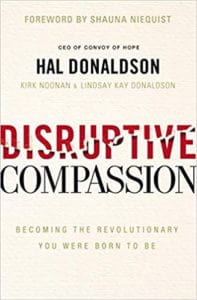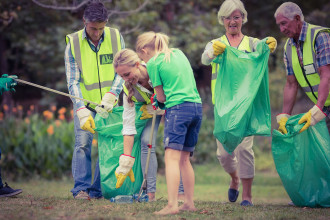Excerpt:
Mr. Hal Donaldson: Yeah, I think a lot of times all of us, we become paralyzed by the enormity of the task. And it’s easy to say, “Well, I can’t solve world hunger.” But Jesus never asked us to solve world hunger. He asked us to feed the person in front of us.
End of Excerpt
John Fuller: Hal Donaldson, the founder and president of Convoy of Hope, joins us today on Focus on the Family to give you some ideas for making a positive impact right where you are. Welcome to our program. Your host is Focus president and author, Jim Daly and I’m John Fuller.
Jim Daly: John, all of us have a deep desire in our hearts to make our lives count for something. And we want to do great things for the Lord and that’s good motivation. Lead people to Him, help the hurting, really do the Gospel. But when we go through seasons like this one, where there seems to be more hurt than ever before in our world – there is suffering and poverty and injustice. It’s easy to start looking at our sparse bank accounts (laughter) and think, “How can I make a significant impact?”
John: Mm hmm.
Jim: And the truth is, one person can do more than you probably think. And I experienced firsthand in high school with my coach, Paul Morrow. I’ve mentioned him several times. But that one football coach, he’s led hundreds of young men to Christ in a public school. He’s passed away just recently. I was at his funeral and literally there were hundreds of his students there remembering him and what he did for them. And that’s just one life. So, you can do it and you can have an impact that is well beyond one person.
John: You can, and Hal Donaldson is here to share from his life experiences. He is the founder and CEO of Convoy of Hope, a faith based nonprofit organization that focuses on disaster response and community outreach and children’s feeding initiatives. And here at Focus, Jim, we’ve partnered with Convoy a number of times in the past for disaster relief, so it’s really an honor to have Hal with us.
Jim: Hal, welcome to the program.
Hal: Hey, Jim. Thanks so much for having me. John. Good to be with you. And, uh, right at the beginning I do want to say thank you. Thank you to Focus on the Family and all your listeners for just your generosity and partnering with us and enabling us really to meet more needs.
Jim: Well, it’s been a pleasure. And you do a great job at Convoy of Hope. And, you know, we do our homework, so we know you’re doing a wonderful job.
Hal: Thank you.
Jim: And I think that’s one of the reasons I wanted to give you more exposure, really. But the key to this is really your childhood, what you grew up, what the Lord did in your life. Uh, it gave you that motivation. So, let’s – let’s go in that direction. You were that little boy facing horrible circumstances. I know your story but share it with the listeners. What happened at a young age that kind of bent your heart toward taking care of others?
Hal: Yeah. When I was 12 – I’m the oldest of four children and…
Jim: Four boys, right?
Hal: Three boys and one girl.
Jim: OK.
Hal: Three boys, one girl. Better make sure we get that right. My sister won’t like that.
(LAUGHTER)
Jim: Yeah. Your sister is going to come down on you.
Hal: That’s right. That’s right. But, uh, at the age of 12, my father was hit by drunk driver, killed. My mother was in the car, seriously injured. Couldn’t work. And my parents didn’t have insurance. And the man who hit them didn’t have insurance. And so, the family was forced to survive on welfare and the generosity of neighbors and local churches. And so, throughout my teen years of – you know, I experienced the shame of poverty. I know what it’s like to go into a supermarket with food stamps in your hand.
John: Hmm.
Hal: I know what it’s like to go to school with holes in your shoes and holes in your jeans. And that’s before it’s cool – was cool to have holes in your jeans.
Jim: Right.
Hal: You know what I mean?
Jim: Before we paid for it.
Hal: Exactly. And, um – and then the covers were often empty. And so, you didn’t have a sack lunch as well. And – but again, it was a generosity of people. And as a teenager, you know, it really caused me to ask a lot of questions about the goodness of God. But it was the kindness of people that really, I was able to connect the dots to the goodness of God.
Jim: Well, let’s start with that young couple that, you know, they heard about what happened. I don’t know their connection. Who were they and what did they do that was the first kind of eyeopener of generosity?
Hal: Yeah. That first night when the police came to tell us my dad was dead, my mom was fighting for her life. Um…
Jim: Wow.
Hal: …The police officers stepped up to the porch because a number of neighbors and friends had gathered around our house and the police officer said, “Is there anyone here who’s willing to take the four children home with them tonight? If not, we’ll take the children downtown to the station.” And that night, one couple, young couple, raised their hands and they said, “We’ll take them.”
Jim: Wow. And you didn’t – and they didn’t know you really.
Hal: They knew us. They knew us.
Jim: So, as neighbors.
Hal: Yes.
Jim: Okay.
Hal: Great people. They had been in our church. And, uh – and they had – but all they had was a trailer, a single-wide trailer. And so, here they are, you know, essentially adopting a family and they may have thought it was a one or two nights sleepover, but we ended up staying with them for about a year…
John: Hmm.
Hal: …In that single-wide trailer. But they just wrapped their arms around us, showed us love. And…
Jim: His name was Bill?
Hal: Bill Davis. Exactly right.
Jim: Bill Davis. You say in the book he put his arm around you that first night and said something special to you. What was it?
Hal: He did. He, uh – just a very caring man and he saw that I was hurting. And he said, “Hey, Hal, listen to me. Don’t allow the tragedy of your youth to become a lifelong excuse, because where you start in life doesn’t have to dictate where you end.”
Jim: Man, that is powerful.
Hal: It really is.
Jim: Did it grab you as a 12-year-old? Did you get it? Did you understand it? Or did you have to let that play out to fully understand it?
Hal: No, I think I did understand it, although I had times of doubt. You know, times where I really questioned the goodness of God. I questioned whether God was good or whether God was impotent. Why did He let this happened? Did it just happened by chance? Those kind of questions.
Jim: Which are fair. I mean, those are fair questions.
Hal: They are fair questions. They are. Absolutely. And I think, um, if it hadn’t been for the kindness of people throughout my teenage years, I wouldn’t be sitting with you today.
Jim: Yeah.
Hal: You know, that kept me from getting angry and bitter. They wrapped their arms around me. Showed me love.
Jim: Let me ask you a tough question, because I’ve had to struggle with this, too. You know my story as an orphan kid.
Hal: I do.
Jim: And we share that common – you know, unfortunately, that common reality. But I have honestly come to the conclusion and I think my siblings have as well, which is to say that if for all of us to come to the Lord, to live for the Lord, if we had to go through all that again, we would do it. Do you feel that way?
Hal: I do. I do. I believe in God’s scheme of things He took my father’s mangled automobile and he transformed it into a fleet of compassion trucks…
Jim: Wow.
Hal: …That are crisscrossing our country today offering help and hope to millions of people. So, um…
Jim: Let me…
Hal: …Although it’s hard to understand, I do believe God had a plan.
Jim: I mean that is – that’s a wow statement. I mean, you think about that. So, really, you could say that your tragedy was able to lead you to helping others directly. You feel that connection?
Hal: I do. I think as you use the word bent earlier, and that’s – that’s what I believe God did. He bent my heart to poor and suffering people.
John: Hmm.
Hal: And not that I didn’t have my times of selfishness and, uh, self-centeredness. I did. But I never could forget the kindness of people.
Jim: It is kind of that thing when we’re at our darkest point that’s normally where the Lord shows up in such a big way. Right?
Hal: Mm hmm. That’s right.
Jim: Um, it’s – it maybe a whisper when things are good because we’re distracted from hearing His voice.
Hal: That’s right.
Jim: But man, when the chips are down and you’re on your knees, the Lord’s going to show up. He’s not going to leave you out there.
Hal: Mm hmm. Right on.
Jim: And I would definitely encourage you to get engaged with the local church. And, you know, I think even if your motives aren’t pure saying, you know, “I need help.” Just show up. See what the Lord does. Take Him up on that. And hopefully His people will answer…
Hal: That’s right.
Jim: …And I know they will.
Hal: That’s right.
Jim: Let’s get to Disruptive Compassion. First, where’s the title coming from? And what is “disruptive compassion” mean?
Hal: Yeah. I was speaking at the University of Missouri and, uh, after the speech, a number of students came up to an open microphone to ask any question they wanted. And this is what I heard that night. One student after the other saying, “Hey, I want my life to count. I just don’t really know what to do.” And so, coming home that night, I thought, “Wow, wouldn’t it be amazing if I wrote a playbook for people who want their lives to count but they don’t know what to do?” And so, that’s what Disruptive Compassion is. It’s – it’s disrupting your everyday life in such a way that it changes the status quo. And the book is, uh – it gives you step-by-step what you can do to make your life count in a bigger way in a hurting world.
Jim: That sounds so compelling, especially for young people.
Hal: Yeah.
Jim: Because they, you know – they see a lot of, I guess, nothingness around them.
Hal: Yeah.
Jim: You know, why are people striving for stuff?
Hal: Yeah.
Jim: Cars, houses, all that kind of thing. We seem to be striving for comfort. What’s so amazing about the Lord is I do think He works generationally. He puts a sense of direction, a compass, in generations to move one way to the point where sociologists can even describe it. The builders, the boomers, et cetera. There usually is an adjective that comes along with the generation because there’s something descriptive about that generation. Authenticity is one that’s being applied to the 20, 30-somethings right now and those that are younger. And I think this message really appeals to them to say, “I don’t want to just do Christianity in an orthodox way. That’s good. But I want to roll up my sleeves and get involved.”
Hal: Absolutely.
Jim: That’s a little different than previous generations where we’ll go make a lot of money vocationally and we’ll cut a check to the church or to parachurch, which is great. But they actually want to get dirty, you know…
Hal: Yeah. That’s right.
Jim: …In the streets.
Hal: That’s right.
Jim: Did you see that?
Hal: Absolutely true. And the book – one of the key points of the book is that just do the next kind thing that Jesus puts in front of you. Jesus wants to help the world and help hurting people more than we do. He’s just looking for people who are willing. So, just do the next kind of thing he puts in front of you.
Jim: You went through a host of emotions – your teen years, your 20-somethings. One of those things you talked about was apathy.
Hal: Yeah.
Jim: You could get to the point where you’re just going, “It’s overwhelming.”
Hal: Yeah.
Jim: I mean, how many people can you get to an intersection that have a sign saying, “Out of work. Need help.”? And of course, you see those stories in the news about people who abuse that. They’re actually making tax free money and they’re pulling in 50, 60 grand a year standing on the corner. And I’ll confess, I think about that.
Hal: Sure.
Jim: I’ve been also on a trip with Ray Vander Laan who does are That the World May Know series. When you go to Israel with Ray, if there’s a beggar on the street, he’s always putting something in the can because he said very straightforwardly, “God expects you to do that. What that person does with it is their responsibility before God. But you should never pass a beggar without putting something in their can.”
Hal: Hmm. Hmm.
Jim: Is that interesting?
Hal: It’s a great word.
Jim: Because God honors that…
Hal: Yes.
Jim: …Even if the person dishonors that.
Hal Yeah.
Jim: And, uh, I’ve kind of wrestled with that to be honest with you.
Hal: Yeah. I think a lot of times all of us, uh – we become paralyzed by the enormity of the task. And it’s easy to say, “Well, I can’t solve world hunger.” But Jesus never asked us to solve world hunger. He asked us to feed the person in front of us.
Jim: Hmm.
Hal: And which is what you’re talking about…
Jim: Yeah.
Hal: …You know. And I think if all of us begin to live that kind of a life moved beyond compassion, quite honestly, to selflessness.
Jim: Yeah.
Hal: The world will be a different place.
Jim: Well, I hope we continue to grow in that area. There’s always room for improvement.
Hal: Yeah.
Jim: So much of the human experience is room for improvement, right? That’s the goal. Um, you also mentioned an encounter that you had with Mother Teresa. Now, I had a brief encounter at the National Prayer Breakfast observing her in a setting that was phenomenal when she – you know, this is during the Clinton administration. And she was the keynote speaker at the breakfast. And Mr. and Mrs. Clinton were there when he was President. And she turned to them and said, “I take care of the downtrodden. Give me your children. Don’t abort them.” And everybody stood except them. I mean, everybody stood and applauded. It was a poignant moment of what life meant to her. And “if you don’t want your poor and your broken, I’ll take them.” Mother Teresa. “Bring them to Calcutta.” I mean, it was phenomenal.
Hal: Powerful.
Jim: What did she say to you that made such an impact?
Hal: Yeah. You know, I think when you’re raised poor, you know, your quest becomes not to be poor anymore. And so, that certainly was my quest as I got out of college and began my career. I received a book writing contract that took me to Calcutta, India, and when I landed my hosts, they said, “There’s someone we want you to interview for our book.” And they took me over to meet Mother Teresa. And, uh, I was in my late 20s and, you know, somewhat surreal, quite honestly. I’m not sure what I expected, but she was a lot different than what I expected. Very down to earth. Very humble. And…
Jim: Very little. She wasn’t very tall. She’s five foot two or something.
Hal: Very little. That’s right. Yeah. Yeah. And so, in the course of the interview, she just kind of stopped me and she said, “Young man, let me ask you a question. What are you doing to help the poor and the suffering?” And I figured it was probably not a good idea to lie to Mother Teresa, right, you know?
(LAUGHTER).
Hal: I told her the truth. I said, “I’m really not doing much of anything.” And her response was, “Everyone can do something.” And, uh, Jim and John, those words were haunting to me.
Jim: Hmm.
Hal: And I believe that was really the beginning of Convoy of Hope because I began to see, hey, I can do so much more that what I’m doing.
Jim: And in that function. I mean, you a journalist, correct?
Hal: Yes. Absolutely.
Jim: I you were – you thought you’re going gonna make your way there financially.
Hal: That was my goal.
Jim: You realized that journalism doesn’t pay you great…
Hal: Right. Right.
(LAUGHTER)
Jim: …Unless you’re on television.
Hal: That’s correct.
Jim: But, uh, that’s kind of amazing. Speak to that transition though. I mean, you turned it into a vocation to some degree that you went from being a journalist. Mother Teresa has challenged you and then you started Convoy of Hope…
Hal: Right.
Jim: …Um, which is an amazing thing. For some people that’s, “Well, that’s great for Hal Donaldson…”
Hal: Right.
Jim: “…I mean, that convicted him. But I’m running my own little mom and pop shop, and I don’t see giving that up to go start a hunger program.”
Hal: Right.
Jim: So, you know, why did that meet that need in your heart? And what do you say to that mom and pop small business owner who would love to do that, but, you know, they’re giving to the church or maybe giving to Focus and other parachurch groups and they’re doing their thing…
Hal: Sure.
Jim: …And they’re helping Convey of Hope?
Hal: Sure.
Jim: Speak to both sides of that equation.
Hal: Yeah. You know, I believe that when we came back from Calcutta, I never really intended to get involved in feeding the poor. That really wasn’t the goal. It was I saw a need and I responded to that need. And I think vision in God’s scheme of things – vision tends to be incremental. That God asks us to do one thing. We’re obedient to that one thing and then He’ll show us the next thing.
Jim: Yeah. I agree.
Hal: And you have no idea where it will lead.
Jim: Mm hmm.
Hal: You know, I never thought it would lead to Convoy of Hope. I’m glad God didn’t show me this, what it would become, because if He had it would have freaked out.
Jim: (Laughter).
Hal: Totally freaked me out.
Jim: I’m outta here.
Hal: Yeah, exactly. But, you know, I think it’s – it’s just doing that simple thing He puts in front of you and you have no idea where it will lead.
John: Hmm. This is Focus on the Family with Jim Daly. I’m John Fuller. And our guest today is Hal Donaldson. His book, Disruptive Compassion: Becoming the Revolutionary You Were Born to Be, is available from us when you call 800, the letter A and the word FAMILY. Or stop by focusonthefamily.com/broadcast.
Jim: Hal, let’s jump into some ideas that anyone can use to make an impact. You have a story about a man giving a coat and, uh, starting a chain reaction. I think this is a great story.
Hal: Yeah.
Jim: What happened?
Hal: Well, we were at a community outreach, one that had attracted about 5,000 people and it began to rain. And, uh, you know, we have multiple tents. It’s like a huge carnival and, um, began to rain.
Jim: It was cold, too.
Hal: It was really cold. And a number of the guests did not have coats. One man thought, “Hey, I’m going to take the coat off on my back and put it on someone else’s.” A young man. And so, he takes this very expensive leather jacket, puts it on, drapes it on another person. Well, it didn’t stop there. Another person did it, then another and then dozens of people did it…
John: Hmm.
Hal: …And they were just putting coats on people. And it was just so amazing. I think it’s a great reminder when we do what Jesus is asking us to do, other people are likely to come along with us.
Jim: Yeah. But one of the things it requires is context.
Hal: Yeah.
Jim: You had to have that event, obviously…
Hal: Yeah.
Jim: …That somebody could demonstrate that kind of love and compassion and caring and give away literally the coat off their back.
Hal: That’s right.
Jim: And that helps when you have, you know, the church acting like that in an environment where it’s going to be seen. Another story that really – man, it gripped my heart. It’s right out of the Bible. Was the woman who didn’t have much coming up to you and giving you something. What was that about?
Hal: Yeah, I was speaking at a conference and, um, I stepped off the platform with my host, the emcee of the seminar, and I could see a woman running all the way from the back of the auditorium. And as she got closer, I noticed that her sandals were tattered. Uh, her dress was probably two sizes too large. And, um, she came, and I wasn’t sure if she was going to tackle me or hug me, you know?
(LAUGHTER)
Jim: She was coming fast.
Hal: She was coming fast. And, um – and so, you know, she threw her arms around me and she whispered in my ear, she said, “Use this to feed a hungry child.” And she squeezed two one dollar bills into my hand.
Jim: Hmm.
Hal: And as she was walking away, the host leaned over to me and he said, “Hal, you need to know that woman is homeless. And she probably gave you all she has.” I carried those two dollars or replaced two dollars. Gave those to Convey of Hope. But I carried those two dollars in my wallet for a number of years as a good reminder, you know, the sacrifice that people make for others and that when people give to Convoy of Hope, we need to make sure we use those precious funds wisely.
Jim: Well, and it’s right out of Scripture, right?
Hal: It is.
Jim: The woman who gave – Jesus said gave more than anybody else. And she was a poor woman who gave pennies.
Hal: That’s right.
Jim: And He said, “She’s given more than everybody else.”
Hal: That’s right.
John: It makes me think of somebody that challenged me and just said, “You can’t give God.”
Hal: Yeah.
John: Even though I might only have two bucks left in my wallet, maybe He’s saying, “Don’t let your security be in those – those dollar bills. Just go ahead and give them when the opportunity comes.”
Jim: Hal, I want to also hit that enabler thing. I mentioned it a moment ago, the people at the intersections, et cetera. You can justify your way out of helping them. And maybe in some cases it’s true.
Hal: Mm hmm.
Jim: I mean, they – they have their kitchen set up right there. (Laughter)
Hal: Right. Right.
Jim: (Unintelligible) dog and everybody else. I don’t know completely how to manage that. So, I’ll ask you, because you’re in the business of taking care of poor people.
Hal: Right.
Jim: What should our attitude be?
Hal: Well, you know, if Jesus is the One, we emulate, Jesus did not approach people with prejudice or preconceived notions on, um, who they were, what they were going through. When he fed the 5,000, He didn’t ask people, “Which one of you are poor?” He fed them all. And I’m sure some of them weren’t poor. And, um, I think sometimes we approach the needs that people have with a preconceived notion that they really don’t need it.
Jim: Yeah.
Hal: You know, I like to encourage my own family, my own children, you know, approach people with a sense that I’m going to help them unless God whispers to me that I shouldn’t.
John: Huh.
Jim: Wow.
Hal: I think, invert it. Turn it around and, uh, then watch what God does.
Jim: Yeah, that’s – that’s a great thing to do.
John: That’s a really good thing.
Jim: And I know a lot of people, you know, talk about they keep little care kits in their car, and they’ll hand them a voucher to get a burger or something like that.
Hal: Yeah.
Jim: And you can do a lot of different things. Let’s move to your idea of creating that bucket list. Of course, there’s a movie, I think, that – by that title.
Hal: Right.
Jim: But, uh, what does your bucket list look like? And if we haven’t thought about that – I mean, Jean and I have…
Hal: Yeah.
Jim: …I think we got one item on our bucket list that we want to get to the Northeast in the fall. We would love to experience that.
(LAUGHTER)
Jim: …But let’s enlarge my bucket list. What’s yours look like?
Hal: Yeah. Well, I think this is a bucket list generation. You know, I think I wrote my bucket list when I was 50. My kids wrote theirs when they were 12. It’s just…
Jim: Oh, wow
Hal: …It’s a different generation.
Jim: What is a couple of theirs? I just want to know at 12.
Hal: Yeah. “I want to travel the world.” “I want to go all the way around the world.”
Jim: Okay. Yeah.
Hal: You know, or places they want to go to. And, um, you know, I think when you are looking for your mission in life, it’s important to write out your bucket list. What are some things you want to accomplish? “I want to go to the Northeast.” Or in my case, I want to go to Antarctica. You want to go some places. But what are some things that if God would help you, you’d like to do for God and do for the world?
Jim: Hmm.
Hal: And so, in the book, I actually list my bucket list and of things I want to do for God, but also things I want to do while I’m still here walking the earth.
Jim: I like that idea, too, because the Lord wants you to have a joyful experience.
Hal: Absolutely.
Jim: He gives you this gift of life and I – I don’t think it’s selfish to put “Going to Antarctica.”
Hal: Right.
Jim: It’s kind of fun to go see what He created down there, right?
Hal: That’s right. That’s right.
Jim: And, uh, I think He enjoys that attitude of discovery because that is in our hearts and I think it’s a nature or an attribute of God…
Hal: I do, too. I do, too.
Jim: …Personally. Um, you say something in the book that catches my attention as well. It’s not every mission should be your mission.
Hal: Yeah.
Jim: That can be hard because, man, we – you know, every day will say, “Hey, join us here at Focus. Be part of the family movement. Help us strengthen marriages.” I’m kind of sold out to that.
Hal: Yes.
Jim: (Laughter) I want everybody to…
Hal: Right.
Jim: …Participate in that. But I get it. Not everybody’s going to have a passion for that.
Hal: No.
Jim: Even though you should.
(LAUGHTER).
Jim: But, uh – no. Speak to that idea of not every mission is going to be your mission.
Hal: Yeah. I believe we have responsibility to do reconnaissance. We need to go out and see needs, see the world. We’re not going to respond to cries we don’t hear. We’re not going to respond to needs we don’t see. And so, we need to get out and out of the house and out of the bubble, if you will, and see needs. And once we do that, God speaks to us. He speaks to us with clarity. It moves from being just something that maybe burdens you to something you have to do. And, uh – but it begins with you going out and seeing needs.
Jim: That’s a good place to start and finish. Um, I’m thinking of that mom and dad. We have young, you know, families that listen to us. They’re wanting to strengthen their marriage. They’re wanting to parent well. And we’re grateful for each one of you. Trust me. Um, speak to two things that might relate to them. One is the lack of discretionary income. I mean, they’ve got it all out there. They’re taking care of the rent or the mortgage and the grocery bill and maybe some nursery care and some other things. If you don’t have much to give what are some things you can do that may not require a lot of cash, but you can actually participate?
Hal: You know, the book is filled with stories or examples of what you can do. But let me just maybe center on one. Uh, Jim, I think America today has an epidemic of loneliness.
Jim: Mm hmm.
Hal: And the solution to loneliness is not money. It’s people.
Jim: Connection.
Hal: Connection.
Jim: Yeah.
Hal: Yeah. And whether it’s a Zoom call, a phone call, a letter, a note, an email, we can connect with people and let them know that they’re not alone.
Jim: Yeah.
Hal: And, um, I feel like right now that is so critical for each of us to say, “We’re not going to allow people to be lonely anymore. They don’t have to be lonely.” And that doesn’t cost a dime.
Jim: Think of that. I mean, what would an impressive statement. I’m going to look for loneliness and be a remedy to that. That right there is amazing. And, you know, as we’re wrapping up Hal, again, Convoy of Hope. What an amazing thing God has done with your orphaned life if I could say it that way.
Hal: Yeah. Thank you.
Jim: You know what I mean by that.
Hal: Yes.
Jim: And how He’s turned that around. Your pain has turned into passion. But I also want to think of, um, a great story you had in the book, and what a wonderful place to end, about a young man that you met who had a similar childhood to you, but a very different life outcome. What did you learn about his life compared to yours?
Hal: Yeah. He’s a gang member. Drug dealer. And he was – I asked him to tell me his story.
Jim: Hmm.
Hal: And as he began to tell his story, it mirrored mine. Except for one thing, he didn’t have someone that came and wrapped their arms around him like they did for me. He was alone here and out of his aloneness, he turned to gangs and he turned to drugs. And, um, you know, in that moment, Jim, I just was so grateful.
Jim: Yeah.
Hal: I live with a great sense of gratitude. I do. For all that God did through people to show me that He loved me. And I think, you know, if I could just jump to COVID-19, you know, Convoy of Hope through more than a thousand churches and now – has now distributed more than 25 million meals through a thousand churches over – across the country. And, um, we’re seeing churches set up distribution centers in their parking lots. And so, I’m seeing Christians by the thousands wrap their arms around people and telling them that they matter, that they care. And it’s making a huge difference.
Jim: Well, and that’s beautiful. That is how the body of Christ should work. And I am mindful of that. You think of the folks, and even the tension in the country, if there was a mentor, a friend for so many people that are despondent, that are hopeless.
Hal: That’s right.
Jim: Because they don’t have that person in their corner. They don’t have somebody to say, “Hey, you matter. You’re created in God’s image. He has a life for you that is opposite to the Scripture, John 10:10, ‘The thief comes to steal, kill and destroy. But I come that you might have life…'”
Hal Amen.
Jim: “‘…And more abundantly.'” And that’s what you’re providing. I love what you do, Hal.
Hal: Thank you, Jim.
Jim: You’re a brother to me.
Hal: Thank you.
Jim: And I’m glad that we can work together from time to time when those catastrophes occur.
Hal: Thank you.
Jim: And the listeners and supporters of Focus have been generous.
Hal: Yeah.
Jim: And stay tuned. There’s going to be something that happens that we’re going to have the webpage up and we want you to help support what Convoy of Hope is doing to bring God’s shalom, His peace, into this chaotic world. Hal, thanks for being with us.
Hal: Oh, I’m so honored and, uh, I love what you do. I love Focus on the Family and, Jim and John, thank you for inviting me today.
John: Hmm.
Jim: Let me turn to the listener or the viewer and, uh, make sure that you know you can get a copy of Hal’s wonderful book, Disruptive Compassion, right here at Focus. And remember, when you order that resource through Focus, all the dollars go back to support ministry. So, we’re not paying shareholders. I’d much prefer you get it through Focus (laughter) than going to an online retailer who, you know, it’s efficient, but those dollars don’t go into ministry. And we would love for you to order that book now. If you can, make a gift of any amount and we will send the book as our way of saying thank you for supporting the ministry. And if you can, the doubling effect is great because we have some friends that have put up a matching gift, so you’re $25 gift turns into $50. It’s just a fun way to spur on giving for the kingdom. And we would love for you to participate in ministry with us.
John: Get in touch today. Donate as you can. And we’ll send a copy of the book Disruptive Compassion by Hal Donaldson as our thank you gift. Our number is 800, the letter A and the word FAMILY. Online you can find a book and an opportunity to donate as well as other resources to encourage you in your spiritual growth. It’s at focusonthefamily.com/broadcast.
Jim: Hal, before we end, I want you and listeners to know, do you know that 800 people a day come to Christ through Focus on the Family?
Hal: Incredible.
Jim: I love that.
Hal: That’s amazing.
Jim: That’s kind of the foundation to it all, right?
Hal: Oh, incredible. Yeah. Thank the Lord.
Jim: So, we’re thrilled with that. So, help us reach other’s for Christ.
John: Well, that is job one for us is to introduce people to Christ and if you want to be part of changing the world, consider a contribution to this ministry. Again, our number is 800, the letter A and the word FAMILY. Be sure to join us next time. We’ll have a powerful story of a couple staying together even after infidelity.
Teaser:
Dr. Audrey Meisner: Finally, the voice inside my heart said, “There’s nothing about this about this that is you, Audrey. This is not you. This is not you. You love your husband. You love your children. You love your family. You love God. This is not you.” It’s screaming, “Stop! Stop! Stop!”



















